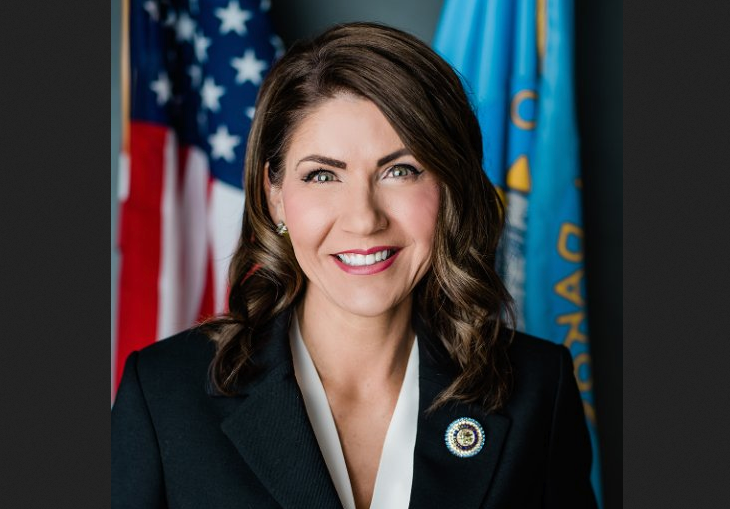South Dakota Gov. Kristi Noem will fight to overturn a judge’s order blocking a rule to protect unborn babies and mothers from dangerous abortion drugs, she told reporters Thursday.
Noem, a pro-life Republican, created a new rule requiring medical supervision for women taking the abortion drugs after the Biden administration began allowing abortion drugs to be sold through the mail without a doctor’s visit. However, Planned Parenthood and the American Civil Liberties Union sued, and a federal judge blocked the state from enforcing the rule earlier this week.
At a press conference Thursday, Noem said her administration will appeal the ruling and fight to protect women’s health in South Dakota, Keloland News reports.
Noem faulted the judge for focusing on access to abortion rather than women’s safety, the reason for the rule.
“It was interesting to hear her argument,” she told reporters. “It was more about making it an abortion issue, which clearly in this telemedicine abortion order that we put forward, it’s about women’s health. It is four times more likely a woman will end up in the emergency room from utilizing and accessing abortion through this manner.”
SUPPORT LIFENEWS! If you like this pro-life article, please help LifeNews.com with a donation!
Typically, abortion facilities give the first drug, mifepristone, to the woman in person and then send her home with the second drug, misoprostol, to take a day or two later – though some now are mailing them both to women without ever seeing her in person.
Under Noem’s new rule, abortion facilities must provide direct medical supervision by giving the first and second abortion drugs to the woman in person. Because the drugs are given a day or two apart and the state also has an informed consent waiting period, the rule means women must make at least three visits to the abortion facility.
Noem said they want to be sure that women receive adequate medical supervision when they have abortions.
“And that is why we put it forward is to protect women’s health and make sure that they are medically supervised,” she said, according to the news outlet. “The federal judge chose to make it about something else, and that’s disappointing. We will appeal.”
On Tuesday, U.S. District Judge Karen Schreier, a Clinton appointee, issued a preliminary injunction blocking the state from enforcing the rule. Schreier said the rule creates a “substantial obstacle” to women seeking abortions, and “Planned Parenthood and its patients [would] face irreparable harm” if the state enforces it.
Lawyers for the Planned Parenthood abortion chain said it cannot comply with the rule because its only abortionist flies into the state only twice a week, according to the report.
But Noem said the drugs are dangerous, and a doctor should be available to help women.
“In the instance of telemedicine abortions, someone can make a phone call, get online, order the drugs to be sent to their home,” she told reporters. “There is no medical supervision. That’s what makes it so dangerous. And that kind of access opens it up to our young women to be in their bathrooms or locker rooms alone undergoing this procedure with no doctor or physician … tied to the responsibility of what the consequences may be.”
Those suing to block the rule include Planned Parenthood, the ACLU of South Dakota, Michael Drysdale at Dorsey & Whitney on behalf of Planned Parenthood Minnesota, North Dakota, South Dakota (PPMNS) and its medical director, Sarah Traxler.
When Noem introduced the rule, she emphasized the need to protect mothers and unborn babies after the Biden administration disregarded the dangers of the abortion drug mifepristone and began allowing abortion businesses to sell it through the mail without ever seeing the woman in person.
Mifepristone is used to abort unborn babies up to 10 weeks of pregnancy. It blocks the hormone progesterone and basically starves the baby to death. For decades, the FDA required that abortionists provide the drug in-person after a medical examination because of its high risks. In December, however, the Biden administration got rid of the in-person requirement and began allowing the drug to be sold through the mail.
In response, a number of states are taking action this year to protect women’s safety by banning mail-order abortions.
The FDA has linked the abortion drug to at least 24 women’s deaths and 4,000 serious complications between 2000 and 2018. However, under President Barack Obama, the FDA stopped requiring that non-fatal complications from mifepristone be reported. So the numbers almost certainly are much higher.
Studies indicate the risks of the abortion drug are much more common than what abortion activists often claim, with as many as one in 17 women requiring hospital treatment.
A recent study by the Charlotte Lozier Institute found that the rate of abortion-related emergency room visits by women taking the abortion drug increased more than 500 percent between 2002 and 2015.
Meanwhile, in the United Kingdom, new government health data shows a massive hospitalization rate due to abortion drugs after the government began allowing mail-order abortion drugs in 2020. According to the data, more than 10,000 women who received the abortion drugs by mail needed hospital treatment in 2020, or about one in 17 women.
A 2009 study “Immediate Complications After Medical Compared With Surgical Termination of Pregnancy,” in “Obstetrics and Gynecology” found a complication rate of approximately 20 percent for the abortion drugs compared to 5.6 percent for surgical abortions. Hemorrhages and incomplete abortions were among the most common complications.








